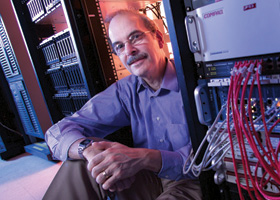Feature Story
Health Center Today, September 24, 2009
Loew Awarded Multi-Million Dollar NIH Grant Aimed at Encouraging Transformative Research
Research Goal - Discover the Rules for Assembling Human Tissue to Aid in New Drug Screening
By Carolyn Pennington

Professor Leslie Loew.
Professor Leslie Loew, director of the Center for Cell Analysis and Modeling, is part of a team of researchers who have received federal funding to systematically assemble functional human kidney tissue from tissue modeled on a computer. If successful, the research—which ties together several emerging technologies including virtual tissue modeling and nanofabrication—could lead to a more predictable way for researchers to engineer tissue outside the body and, consequently, to screen for new drugs.
The project, called Dynamics Underlying Tissue Integrity, has been awarded a five-year, $6-million grant from the National Institutes of Health’s Transformative Research Projects (T-R01) program. T-R01 is a new program designed to support exceptionally innovative research initiatives whose anticipated outcomes have a major impact on broad, important problems in biomedical and/or behavioral research.
Loew, who pioneered the development of a computational modeling platform called the Virtual Cell, will be collaborating with researchers from Mount Sinai School of Medicine and Columbia University. For this project, Loew will develop computational models of how cells interact within kidney tissues. These computational models, or virtual tissue, will form the basis for designing the device for recreating kidney function. The hope is to learn the rules of tissue organization as the team refines the device through testing the computer models and imaging the flow of cell signals within the reassembled tissue from both mouse and human cells.
Dr. Francis S. Collins, NIH Director, says the T-R01 program "is intended to support research that has the potential to transform the way we think about and conduct science, so the recipients represent an elite few with truly bold ideas. Competition for the awards was fierce, and standards very high."


